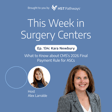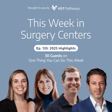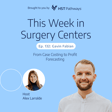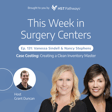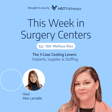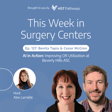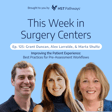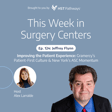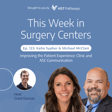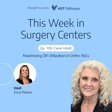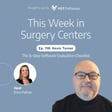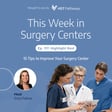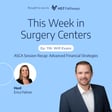Become a Creator today!Start creating today - Share your story with the world!
Start for free
00:00:00
00:00:01

LIVE! Four Stories from Real People Changing the Industry | This Week in Surgery Centers
Last week, HST Pathways held our first live podcast event! We were joined by four ASC leaders who joined our panel to discuss 2023 trends and the four pillars that are top of mind for every surgery center: Patients, Physicians, People, and Payers. Our panel shared excellent first-hand advice, shared tips for succeeding in 2023, and answered audience questions live. A huge thank you to ASCA for helping us organize this event, and a huge thank you to our panelists, Eliza Alberto-Widdowson, Jeffrey Flynn, Kris Kilgore, and Kayla Schneeweiss-Keene, for joining us.
Brought to you by HST Pathways.
Transcript
Introduction and Format
00:00:01
Speaker
Welcome to This Week in Surgery Centers. If you're in the ASC industry, then you're in the right place. Every week, we'll start the episode off by sharing an interesting conversation we had with our featured guests, and then we'll close the episode by recapping the latest news impacting surgery centers. We're excited to share with you what we have, so let's get started and see what the industry's been up to.
Insights from Live Podcast Event
00:00:27
Speaker
Hi, everyone. Here's what you can expect on today's episode. Last week, HSC Pathways held our first live podcast event titled Four Stories from Real People Changing the Industry. The discussion was focused on 2023 trends and then did a deep dive into the four pillars that are top of mind for every surgery center.
00:00:49
Speaker
patients, physicians, people, and payers.
Core Pillars of Surgery Centers
00:00:53
Speaker
Using their own experiences, four ASC leaders joined the panel, Alisa Alberto Widowsen, Jeffrey Flynn, Chris Kilgore, and Kayla Schneeweiskeen, with each focused on one of those four pillars. The discussion was filled with great tips and real actionable items to help ASC leaders continue to succeed, so I think you'll find the content informative and interesting.
00:01:18
Speaker
Hope everyone enjoys the new format for this episode, and here's what's going on this week in Surgery Centers. Thank you all so much for joining us this afternoon. I'm Erica Palmer from HST Pathways, and I'll be moderating today's discussion. Before we jump into the content we put together for you, I just wanted to share a few housekeeping items. First,
00:01:45
Speaker
I know everybody says this, but we do really want today's discussion to be as interactive as possible. So please feel free to use that Q&A box at any time and make questions. And I will make sure to get your questions in front of our speakers at the right time. And if we have enough time at the end, we can definitely stay on to hear any other questions you might have.
00:02:09
Speaker
And second, you are all part of a little history today as this is the first live event we're hosting for HSC's podcast called This Week in Surgery Centers. So this will be recorded and the episode will be released this Tuesday, and you'll be able to find it on Spotify, Apple, and YouTube. And lastly, just a huge thank you to ASCA for their partnership in helping and spread the word about today's event.
2023 Trends in Ambulatory Surgery Centers
00:02:38
Speaker
So what are we looking at? So today we'll do some quick introductions. We'll do a quick recap of looking into 2023 and what can we expect. And then we're really focusing our discussion today on these four pillars. So patients, physicians, people, and payers.
00:02:57
Speaker
So we'll spend the majority of our time kind of diving into those four different pillars and see what our panel is up to, what they're expecting and going into 2023 and kind of what trends we're seeing and what they're doing at their own surgery centers. So who are today's speakers? I am so grateful, so appreciative to have these four ASC leaders
00:03:23
Speaker
On with us today, we have Elisa Alberto Widowsen from Man Cataract Surgery Center, who's going to talk about patients. We have Jeffrey Flynn from Grammarcy Surgery Center, who's going to talk about physicians. We then have Chris Kilgore from Surgical Care Center of Michigan to talk about people, which is staff. I just had to stick with my pee alliteration.
00:03:48
Speaker
And then we have Kayla Schneeweis-Keene, who's from Mannequin Cataract Surgery Center. He's going to talk about payers. So I'm really excited to eventually hand the floor over to them very shortly. So looking to 2023, there's obviously a ton of stuff going on in the industry.
00:04:09
Speaker
I tried to shy away from anything in this slide specifically that our speakers would be touching upon later. So these are just some other trends that that we can expect. And a lot of these are obviously weave into those four pillars that that we're talking about later on.
00:04:26
Speaker
But just at a high glance, a couple things that we're seeing come up a lot in questions and discussions. The first would be growth. So looking into the new year, it seems like growth is something we can all anticipate. A couple reasons why ASCs are reporting that they still have a backlog of cases and patients.
00:04:48
Speaker
from the pandemic that need to be performed. And then Kayla will talk a little bit more about this as we get to the payer section, but we are expecting payers to continue to push more procedures to the outpatient setting for various reasons. And then three specialties that are expected to see the most gross this year are total joints, spine, and cardiovascular.
00:05:12
Speaker
A second trend that we're anticipating is more value-based health initiatives. So this is something that has long been talked about, but it's finally time for ASCs to really shine here. We have the tools to do so and really think about how they can capture and track as much usable data as possible.
00:05:35
Speaker
Another trend that is just going to continue to develop has been a trend for a while now is this idea of price transparency. So hopefully everyone is well versed by now on what this piece of legislation is and how ASEs can comply because it's only going to continue to expand and despite some of the lawsuits that are
00:05:57
Speaker
flying around right now, mostly on the hospital side. I don't believe they will make much of an impact in the short term or long term. So definitely keep an eye on price transparency and kind of lean into that trend with your patients. A next trend that we're seeing and talking about a lot is kind of the anesthesia component when it comes to surgery centers. Now, even I have to admit, this is
00:06:23
Speaker
the relationship between a surgery center and an anesthesia group is probably the area I personally understand the least or just have had the least exposure to.
Collaboration with Anesthesia Groups
00:06:33
Speaker
But my understanding is that historically the majority of people who work in a surgery center don't fully understand that surgery center's relationship with their anesthesia provider. Whether that's not considering your anesthesia group when you're scheduling cases,
00:06:50
Speaker
not really considering them a stakeholder and also not fully understanding how these anesthesia groups receive reimbursement. And the reason why we believe this is important is given the challenges the industry is facing around staffing shortages and rising costs, working closely and kind of becoming best friends with your anesthesia group is going to be extremely important just to make sure they can cover your cases and that everyone is profiting.
Technology Adoption in ASCs
00:07:21
Speaker
Another trend here would be interoperability. So again, nothing new. We've heard this kind of buzzword a lot recently, but in order to compete with hospitals and make surgery centers the premier choice, ASCs have to kind of step up their technology game still. Now this does not go for every surgery center. You know, most surgery centers we encounter have some level of technology woven in and understand the importance of kind of leaning in more.
00:07:50
Speaker
But by adopting technology throughout the entire patient journey, your patient staff surgeons will have a better experience, improve workflow, get rid of silos, all the things that kind of get you to that ideal state. I certainly know the price tag can be intimidating and change is always hard, but it is time.
00:08:11
Speaker
Another trend here that I personally don't think gets talked about enough is lobbying. I would be curious if we did a poll right now to see how many of us on the call would consider ourselves politically active when it comes to advocating on behalf of the surgery center's role in the overall healthcare ecosystem.
00:08:34
Speaker
You know, ASCA and all the state ASC associations obviously do a ton of lobbying for the industry, but I think it's just critical that everyone is doing something.
00:08:44
Speaker
And the best part is that you don't need any experience or training or education in politics to make a difference. It could be as simple as picking up the phone and connecting with your legislators, inviting them to your facility for a tour. Unfortunately, most legislators don't understand what an ASC is and how they differ from a hospital. So a little education can really go a long way. So highly recommend kind of leading into lobbying this year and doing your part.
Robotic Technology and Patient Experience
00:09:13
Speaker
And then lastly, robotics. I always think this part is super cool. I don't have a clinical background. So whenever I'm reading about robotics, I'm always fascinated. And my understanding is that accessibility of surgical robots is getting better as they become more common and more competitors enter the space, prices are dropping, and there are more and more options available to surgery centers. So I encourage everyone just to keep an eye out for what options might be out there that could work for you.
00:09:45
Speaker
OK, so now I'm going to hand things over to Alisa, who's going to talk about the patients pillar. Oh, you're just on mute. It wouldn't be a webinar if one of us didn't do it. Good afternoon, everybody. So what I'm going to talk about is how important patients
00:10:14
Speaker
experiences in order for them, for us to attract more patients to go to ambulatory surgery centers versus hospitals. So patients, we need to look at them as consumers. Also think of them like shoppers. Picture your process of choosing a new restaurant. You might go online to research reviews and look at photos, or you might call a friend for recommendation, which
00:10:44
Speaker
I often do that. I would call someone say, have you been to this place? Or it doesn't even matter where it's a hair salon or a place, a restaurant, right? We ask our friends or anybody, our coworkers, you know what, for their opinion, the same thing with patients. They will ask their friends or relatives to see for their opinion regarding an ASE or a hospital or a physician. So you better believe patients are doing this while choosing where to have a procedure done.
00:11:15
Speaker
And the most basic form of marketing is word of mouth, which is very effective from what we've experienced. Kayla can vouch for this too. Therefore, providing each patient with great experience will motivate to recommend the ASE to others, which is great marketing. Additionally, with almost everything being posted online, prospective patients are always looking for good and bad reviews regarding
00:11:43
Speaker
an ASE before making their decision whether if it is the right facility for them. Hence, this is why it is important for employees to give every patient and their families the best experience from the minute they walked into your facility because this will not only promote patient satisfaction, but it will also benefit your ASE because it will increase your case volume.
Price Transparency and Patient Billing
00:12:10
Speaker
Next slide, please, Erica.
00:12:12
Speaker
Price transparency. So price transparency will be expected. Payment issues from patients usually arise when the patient does not understand the payment schedule. Therefore, price transparency is a must. It is important that we give patients full disclosure of how much, who are they paying, what are the services being rendered to avoid
00:12:40
Speaker
any stress during the day of surgery. We work closely with our, also with our medical practice and both the practice and our surgery center give the patients an accurate financial estimate in advance before their surgery. It is important to disclose to patients what services are being provided because it does build trust and promote effective communication between the patient and also the facility.
00:13:10
Speaker
This also allows the patients to be better prepared to meet their financial obligation for their surgery without any surprises, hence the No Surprise Act, which we need to be compliant or stay compliant. We are also planning on transitioning to taking payments prior to the day of surgery, which we believe will be very beneficial to all ASCs if they do this, because this will definitely alleviate some of the stress on the day of surgery.
00:13:38
Speaker
and will also reduce the burden on your administrative staff. In our facility, some of the issues that we encounter, we have patients coming in who's using care credit or I'm sorry, other financing sources. And sometimes we'll have issues with not being able to find their account number or they don't have
00:14:08
Speaker
enough to pay for surgery, all of these can be avoided if we transition on taking the payments in advance. Also, remember, you can provide the patient an excellent outcome, but it doesn't matter because overall,
00:14:30
Speaker
When there are issues or miscommunication with payments, this could lead to an overall bad experience from a patient's perspective. For example, a patient can have someone who had cataract surgery seeing perfect 2020 vision. And then 30 days later receives a anesthesia bill. And this has happened before. They command a facility. They thought they've paid everything already on that day of surgery. And here they are.
00:15:00
Speaker
questioning what is this fee that they received in the mail. So this is really important that we explain to the patients prior to surgery how much it will cost for their procedure, if there's gonna be other fees, physician, facility fees, anesthesia, et cetera. Those are very important to disclose to the patient. So to promote better patient experience.
00:15:30
Speaker
Next slide, please. Yes, I just have one question for you there too. I'm curious, this goes for the panel, would you say in your patient satisfaction surveys, like what out of the negative reviews and feedback would you say the majority, the ones you get are around financial concerns and frustrations there? Yeah, a lot of frustrations.
00:15:54
Speaker
are the miscommunication with especially the anesthesia fee in the past, which right now we're trying to streamline. Like I said, like collecting the payments in advance, but we're still in the process. One of the most on our patient surveys that are, that is a concern, um,
00:16:20
Speaker
are patients having to swipe their cards multiple times instead of just one payment. Payments are wishing they could just make one payment instead of one payment for anesthesia, one payment for facility, one payment for physicians. So now I know a lot of healthcare organizations or ASCs have tried to streamline and just collect one payment, but it's important that you stay compliant. You can't just collect a whole payment and then say, oh,
00:16:50
Speaker
I'm, you know, I'm going to pay the physician. It has to be separate. Sure. Makes sense. Thank you. All right.
Improving Patient Experience
00:17:03
Speaker
Patients expect high functioning technology, but it also depends on patients demographics, which is very true where the AC facility that, um, that I'm in,
00:17:20
Speaker
The demographics that we have, we get a lot of rural areas, patients that do not have access to computers, for example, or not tech savvy. But overall, what Erica pointed out just a few minutes ago, it is important that we stay competitive with the hospitals. And that's how we're going to attract all of these patients to come to our ASC.
00:17:48
Speaker
One thing that was a game changer for us was online pre-assessment forms, which is patient portal system. What it did is it facilitated patient engagement in healthcare decisions and improve our communication with the patient. And also with this patient portal system, our patients can access pre and post-op care before their surgery. Patients can also fill out their forms on their own time in the comfort of their own home.
00:18:18
Speaker
The implementation of our patient portal system played an integral part on increasing the efficiency and productivity of our surgery team. So such as a high volume AC, just like what we have here in Houston, Texas, it could definitely benefit from it because it will save a lot of time for your staff. Before we transition to the patient portal system and the pre-assessment forms,
00:18:47
Speaker
one nurse will spend about 20, at least 20 or so minutes per patient. So if you have 20 to 40 patients in that one day, that's a lot of hours that you're spending on pre-assessment calls. So when we did the calculation and the study on this, we, after a year, we've calculated that on average, we are saving at least one FTE per week since we
00:19:16
Speaker
implemented the patient portal system. Now with the EMR system, electronic patient satisfaction surveys, text notifications, and especially credit card, which our facility currently are not taking cash to avoid any other conflicts, this just makes it more streamlined and just a lot better for the patients. Having said that, with the high functioning technology,
00:19:46
Speaker
It is important to accommodate these patients, the ones that are not tech savvy, like I mentioned, because they do need assistance on filling out those forms. And what we do with those patients, either we'll have them come in early before their arrival time, so then we can have a one-on-one with the patient and help them out on the day of surgery, or the day before we would try to call them
00:20:16
Speaker
and help them out with their pre-assessment form. Enhancing patient experience in the AAC. This is actually my favorite topic. Patient experience is very important. I would call this the essentials, so to speak,
00:20:44
Speaker
improving patient experience in the ASE. So number one for me is employing professional friendly staff. You need to employ someone who's professional friendly staff who are informative, helpful, courteous to all because it is a must. They are the ones that shapes the patient's first impression of the facility. So as soon as the patient walks in, those are your front desk coordinators.
00:21:09
Speaker
be smiling and very welcoming. And that gives the patients already peace of mind. Second is setting expectation with patients. Establishing expectations for patients and their families for all steps of the surgical process, such as scheduling details, financial obligations, procedure day flow, and post-op care is essential. They're all essential. This allows them to know what to anticipate and prepare accordingly.
00:21:38
Speaker
Effective communication is the key. Price transparency is the third one. Being upfront, especially regarding financing, is important. This avoids any billing surprises down the road of patients. Patients knowingly, exactly what they will need to cover, helps reduce their stress and fear, making for a more pleasant surgical experience.
00:22:04
Speaker
Fourth one is staying organized. Being organized around the patient's schedule and other operational aspects of the ASC gives the impression of competency amongst the staff. And organized ASC also reflect attention to detail, cleanliness, and care. Also, patients will feel safer getting a procedure done in your family than a hospital as the environment will reinforce that they are in good hands.
00:22:31
Speaker
The next one is effective communication on pre and post-op care. Communicating post-op instructions to patients and their families before leaving is imperative to customer service and compliance. This ensures they know that they should and should not, what they should and should not do at home to achieve the best outcome. Also follow up with post-op call later to make sure recovery is going well, which is it makes the best
00:23:01
Speaker
patient experience for everybody than a successful outcome. When we call the patients at the end of the day and just checking on them, they actually, they're very surprised because it's not very common anymore as from what I am hearing from the patients that that's not a very common practice that doctors or
00:23:27
Speaker
or other places we'll call them after a procedure just to check on them. Usually they'll call them a week or a month later just to check on them. But in our facility, we check them the day before just to make sure that they're not having any pain or any discomfort and making sure that they understand their instructions. Last one is staff satisfaction. Nothing influences the patient experience boards and staff happiness because happy staff means happy patients.
00:23:56
Speaker
Staff happiness comes from leadership, support, surgeon appreciation, and the ability to learn and celebrate successes together. Satisfied staff will enjoy their work and offer specialized one-on-one focused patient care. And it also creates a positive experience and spreads happiness to patients. Some of the things that we do at our ASC to appreciate, show appreciation to our staff is celebrating each employee's birthdays,
00:24:24
Speaker
bringing donuts in the morning for treats. We started doing a quarterly trip to a restaurant with a whole surgery team every time that we have a day that we finish early. Or even just a simple thank you goes a long way. So just make sure you show appreciation to your staff. And that concludes my presentation.
00:24:47
Speaker
Thank you so
Building Relationships with Physicians
00:24:48
Speaker
much. So many great tips in there and obviously patients are extremely important to the workflow of the surgery center. All right, switching gears to physicians pillar, Jeffrey, I'll let you take it away. Great. I'll just briefly give you a little history where we started in a very different way, but this relationship aspect for physicians
00:25:14
Speaker
is a really great way for long-term relationships. Grammarcy, when it started, was not physician-owned, so the physicians truly were the customers. You could only really do that in New York City because we had such an oversaturation of doctors here.
00:25:30
Speaker
But separately, we've grown. We've had satellites. We're significantly positioned on now. But we've also developed a management company. So we've actually created other centers that are completely positioned on. But I want to talk to you about how it is in developing the relationship, because the relationship needs to be for the long term. One of the key things right off the bat is to find out what is your surgeon's plan, both their short term and long term plan.
00:25:57
Speaker
I want to give two examples. I had somebody start with me over 20 years ago here. I've, Gramercy started 20 and a half years. We're now 20 years and six months old. But what happened was interesting was somebody was just starting their practice, renting exam rooms, rushing around, but needed a place to develop and do surgery. And part of the issue was in the hospital, he just didn't have the numbers or anything else.
00:26:27
Speaker
guaranteeing a positive relationship wasn't going to be there. So him finding Gramercy, he always felt was a great opportunity. 20 years later, this doctor is one of my busiest surgeons and he has six doctors working for him. We worked with him and he always attributes back to Gramercy that if he didn't have the time and the surgical experience, a lot of the stuff that Elisa just said in that whole
00:26:55
Speaker
area to build his own practice. He made the Gramercy team his own team extension when he was here. And that was something we knew what his short term and long term plans were. We were able to help him in the short term to build his own practice. And now he's one of the most significant contributors here to our income because he has developed a successful practice and did it really around the surgery. There's also some short term things you can do. I've actually had a number of the chiefs of different hospital programs
00:27:25
Speaker
come to me and say, the last two years, I just want to do a little bit of stuff. I want to do something simple. And then I want to ride into the sunset. Is Gramercy a place I can come? And some of these people turned out to be the most renowned doctors in the country, but they just wanted to like edge out into retirement. And there was a place for that here too. So we were able to find those different ways for that to happen.
00:27:49
Speaker
But when meeting the surgeon right off the bat, I think the person is finding out what are their current pain points. What's not going well in their practice, in their surgery aspects? And what can you do to solve it? Do you have a time that you can give them? Our turnover times we know are notoriously better than the hospitals. But is that something that really gets to the doctor? Is it the day that he's using? Is that part of the situation? You've got to talk with the doctor and understand what his
00:28:18
Speaker
situation is and her situation is. And then on top of it, determine whether you can help them or not. And as I say, bring them into your world. I think, and again, going back to Elisa's situation about the staff being happy and being part of a positive environment around is what that's what the surgeon wants to come and have a simple day. Surgery tends to be their favorite day because they were able to kind of go through. They're not dealing with the
00:28:48
Speaker
you know, the minutia of their practice, you know, the patient we all know is asleep for most of their procedure. So they're coming in and they're really doing and really performing what they're best at. But also to understand, and this is the key factor is if you can't promise them something and you can't deliver on that, make sure you're really upfront about that. And I can tell you doors open down the road.
00:29:15
Speaker
We've opened centers for doctors that we just weren't able to accommodate them at Gramercy. We opened an IVF GYN Center in New York City. We were never going to be able to house that at Gramercy. They had to go out and do it themselves. But we could be part of that process and help them to do it. And it allowed us to grow and get more involved in everything. But it was important to know that I couldn't fit that here.
00:29:40
Speaker
And I didn't want the doctor to understand. And you have to realize so many of them come back to you and everybody's kind of heard it. The hospital promised me this when I got there. And then three months later, six months later, two years later, they completely took it away and there's nobody I can talk to about it. That's something that this is where it's our place. We do our best here because we're able to deliver if we're able to be upfront. And again, developing that relationship with the doctor.
00:30:11
Speaker
Erica, if we can go to the next room. Okay, one of the best aspects and it provides for a positive environment is listening to the doctor on new ideas and new technology. That's really where you learn it. A lot of times they'll learn it from a rep, but coming forward through is kind of listening to them. Is this something that you can do? I've gotten certain devices at the center to say that sometimes it's used in the practice, sometimes it's used in surgery centers,
00:30:40
Speaker
But I simply can't afford it in my center. But if you got all of the doctors together in that specialty, is that something you could afford at the center to offer us? And, you know, sometimes it's been yes, sometimes it's been no. The best part about that is to really make sure the doctor is part of the feasibility that you're doing. You're keeping him involved in. We're going to look at the price. We're going to look at the reimbursement. We're going to look at the safety aspects. And is this something that we can deliver?
00:31:10
Speaker
for you, and is this a new line of a procedure that we can do, if they're involved from start to finish and you really over communicate, because if it's something that you find that you really can't do, they're more accepting of it if they're looking at all the numbers, if they're actually seeing it on paper. I mean, let's face it, they're scientists first, so they really are seeing on paper what's actually the situation and how to go forward.
00:31:37
Speaker
And then there's the other parts of going through is when an issue arises with a doctor or issues arise for the center that you need to talk with the doctor. You really need to talk to them as a problem solver, that you're coming to them and speaking to them about an issue or an issue they're upset about. You don't want it to be us against them. That's always the way it is in the hospitals and we always see that and we hear that consistently. This is where we can be, as I put it, the unhospital. We can really focus on
00:32:05
Speaker
let's look at the situation. There's certain things like in our data shows and there's a lot of from technology certainly with HST and others is that specifically you really can get down and dig into the data and do some analysis to say that like for instance this particular situation or this particular implant is just not affordable. It's not reimbursed
00:32:27
Speaker
for a significant part of your payers, but there are some other alternatives that we can look at. And if you're showing them that particular information and you're providing them alternatives, they actually believe in the relationship and the long-term relationship that you have. And that's what I think is very killier. Don't avoid them when there's a problem. Make sure you're right there and right there to hear what they're saying. If you are the age of reason and you're the one who can take the deep breath and go through the conversation,
00:32:58
Speaker
then they leave feeling that at least they were heard, they were validated, and even if it turns out to be something that their answer isn't going to improve, that's the case there. If it's something that your staff has done and it's something that you can actually say, well let's talk with the staff and see what we can do to do better in a team process, the doctor feels better about it and also doesn't feel like they've just thrown the staff over the over the clip. They really do
00:33:23
Speaker
If you really can sit there and say, okay, this day didn't go well, let's do a little Monday morning quarterback to find out why it didn't go well. Is there something we all could have done differently in this process?
00:33:35
Speaker
Could the doctor have shown up 15 minutes early? Was there something in that day? Did the patient show up later? Like really dive in and give them solutions of where we can go. We're finding that some of your patients just simply aren't coming or your staff's communicating and our staff's communicating differently. We need to get the staffs together so that they're sending the one message to them. And that's where it comes down to creating the positive atmosphere. And especially what a lot of what Elisa said,
00:34:04
Speaker
But the positive atmosphere with the doctors is at the end of the day, and I hope all of you as you're in different jobs and ASCs and stay in ambulatory surgery, I've been up for the long term because I really feel that we are providing something that's, it's our time and we are the future here. And the one thing looking back, I was just at a conference this past weekend with a number of my doctors and just hearing them and realizing
00:34:31
Speaker
I've known you for 20 years. I've watched you get married. I've watched your kids grow up. I've watched your kids graduate. You know, we, we have a connection and we have a friendship that we've developed because we've known each other for this many years. And I have to tell you with that, our doctors become our biggest disciples to, you know, we need to build somewhere else. We need to, you know, there's another part of New York. We're actually in the process of building a surgery center in Staten Island because there isn't one there.
00:35:00
Speaker
But it was, you know, my doctors are from Manhattan, Queens, some are from Brooklyn. But the issue is that these doctors out there didn't have one. It was my Manhattan, Queens and other doctors that came forward and said, you know, we really need to have a center out here. Why don't you talk to the Gramercy people about what they can do? And that's one of the things that that's the greatest compliment when your doctors are actually recommending you recommending your center going forward. And then
00:35:26
Speaker
Again, it ties in, as I keep saying back and forth with what Elisa said, is that if the staff and you're creating kind of a community and family setting, and I think you can do that even as you grow, you can do that in each individual center you're doing it. If you're true to the same points that you're always going to be available and understand what the doctor needs. The one factor I say and just underline
00:35:49
Speaker
Even if it's a doctor with a high volume, if you absolutely can't deliver, don't promise them that you can because the issue is it's just going to be a bad relationship going forward. But as I said, doors open later on, and that happened in our situation with the surgery center downtown, that we were able to create the surgery center for them. And we were able to build in and participate in that center and bring other doctors to the center, which we just simply weren't going to be able to accommodate at ours.
00:36:16
Speaker
So I think overall that relationship just remember the doctor's relationship is long-term You want that doctor to be a disciple for your center? And the only way he's going to do that is if he feels he's validated treated with respect and Realistic expectations and I think long-term those realistic expectations Develop a deep relationship that you can have for many years to come That's kind of my presentation
00:36:47
Speaker
That's awesome, Jeff. Thank you. A lot of great tips in there. We did have one question come in. Someone said, Jeff, appreciate what you're doing in New York. How do you recruit physicians? It's one of the best things to do. It's the easiest thing to do. You all have good relationships with your reps that come in.
00:37:09
Speaker
Let them go into the staff room. Don't make them wait in the lobby. Don't be adversarial to them. If you bring them in, they're going to tell you about surgeons because I can tell you right now, especially this is one tip with, there's a few things I can suggest, but with reps, for instance, if they think they're going to get in and out of your surgery center very quickly and it's a pleasant experience, they're going to recommend other doctors, especially when they go into the hospital for your center.
00:37:35
Speaker
I found that countlessly with several reps have literally brought me doctors because, you know, they don't want to wait an hour between cases at the hospital, but at the same rate, when they came in, they were welcome to come right in. They, they signed in, they changed into scrubs. They weren't made to wait in the lobby. They go to the staff room, have some coffee. Let's talk with your doctor going forward. That's one area. And that's a key way to get people faster.
00:38:01
Speaker
The other thing is in your community is asking your other doctors around you is like, who are you, who's busy at the hospital, finding out who's efficient, those types of things. Go and visit those offices. A lot of times you won't get through to the doctor, but if you're actually formulating that relationship to go and visit with a doctor, that's key factor. I have a special thing I do at the beginning when a doctor starts here.
00:38:25
Speaker
I make my scheduling and patient admission team has to physically go with me to the doctor's office. They have to meet the doctor's staff and understand that we're now on the same team.
00:38:38
Speaker
And this is why we called for this meeting together. And then separately, I have our scheduling manager, not only checking in via phone and now obviously Zoom often, but also occasionally once a quarter, just go out these next two days and just swing through all the offices and visit them. Just ask how things are going, show up, show up with something.
00:38:58
Speaker
cookies, donuts or anything, but let's make sure that we're meeting all their needs and let's make sure that they understand that they matter to us. And by showing that presence, the doctors, because very often, let's face it, if the staff has a choice to book cases, they're going to book it at the least of resistance. Whichever is easier for them to book a case, that's where they're going to book it if it's left to them.
00:39:24
Speaker
And very often in busy practices, it is left at schedule to decide where that patient is going to be done. And you have the opportunity there to make it that you're the favorite place to be done. Perfect. Thank you. Great tips there. Thank you, Jeff. That was awesome. And switching gears to Chris to talk about people. I'm sure no one's worried about staffing right now.
00:39:53
Speaker
Hello, everyone. You can change the slide.
Addressing Staffing Challenges and Burnout
00:39:58
Speaker
So we're going to talk about, unfortunately, burnout. I think we all by now had hoped that the situation with our staffing issues would be over. Unfortunately, I think going into 2023, we're still seeing issues with staffing. And it's not just finding the right staff.
00:40:16
Speaker
it's training of the staff. I think it's and again like Jeff said as we increase our technology there is a lot more training that is involved and so I just think that burnout is still a real issue and I put a couple of definitions you know burnout can ruin someone's health or become completely exhausted through overwork
00:40:39
Speaker
I know in our area, we're still seeing a lot of illness. We're still seeing a lot of cold influenza. I think some of the health care team doesn't take care of themselves because they're running on the little rat's wheel by trying to be more efficient, trying to be fast paced.
00:41:00
Speaker
So we're seeing, you know, a lot of issues with mental health in my area. So I'm in the state of Michigan. I think we saw, what did they tell us? 20 minutes a son in the month of January. So we deal with a lot of seasonal depression as well. And it's just another contributing factor when you're also expecting a lot of your employees or your staff in the workplace.
00:41:23
Speaker
Another thing that causes burnout could be doing one task for too long. We try to do assignments of our healthcare team where their staff or their assignments on a daily basis or a weekly basis are varied and we cross train so that you don't have one person doing the same job over and over. At times that can become very monotonous and lead to that again burnout and a negative feeling.
00:41:49
Speaker
And the third definition there is fatigue, frustration, apathy, resulting from prolonged stress over work or intense activity. All these things all to affect your staff morale. We're in a world where we're trying to retain staff. And so we need to pay attention to these things. And how do we avoid this? And so the next few slides, we'll talk about that. So next.
00:42:18
Speaker
So I think some of the causes of burnout that we're seeing in the world that we're living in today is our patient acuity is at a higher level. Used to be the ASCs had their patients were the healthy patients, they were coming in, having a procedure done, going home, everything was great. I do think now we're seeing a higher ASA classification of patients. I think that our acuities have become higher. We're dealing with a lot more issues with our patients.
00:42:48
Speaker
I also think that physicians do, they do like our ASCs and we work in a block time model, but yet we always have those that push the envelope and I just got to put one more case on. It's only going to take me so long, but that adds to the staff burden of staying later, coming in earlier. We're seeing a lot of ads and cancels, which
00:43:11
Speaker
Sometimes you think, what does that mean? But it really affects the team when they the night before go home and think, OK, tomorrow we've got 18 patients and all of a sudden they come in and now they have 22. So I think that that does affect the staff. It affects the receptionist that that have to prepare all the charts and get all the paperwork ready.
00:43:34
Speaker
Repetitive patient care assignments, that can also lead to burnout. We've tried very hard to do a lot of cross training. So we've looked at how do we split those assignments? How do we make it so it's not so repetitive? I'm in a single specialty ambulatory surgery center. So you do tend to have a lot of repetitive tasks. And so we've also looked at our staff mix. Let's add in some LPN, some nursing assistants. We have scrub text, obviously our RN staff,
00:44:04
Speaker
And how do we all work together to take some of the burden off and no task is beneath anyone else. So all of our tasks, nothing is too small or too big for us to handle. So we help each other out in whatever way that we can.
00:44:19
Speaker
Another issue that we're all facing still is staff turnover. Staff turnover leads to negative attitudes. It's expensive for the ambulatory surgery center because now you've had to recruit and train. And so we really need to look at how do we prevent that staff turnover.
00:44:36
Speaker
And one of the things that has really helped us too, when we look at our recruiting of staff, is we ask the staff that's working with us and say, hey, do you know of anybody? We try to give the positives of the environment, you know, Monday through Friday, we're not on call, we don't do weekends, no holidays. So we're trying to do some of those things too to help us recruit some new team members.
00:44:59
Speaker
And again, another cause of burnout can be the continual training. You know, do you use one or two preceptors that get burned out of having to always be the trainer? We've tried very hard to recognize the strengths of our employees and say, okay, let's split up the training. So it's not only one or two people whose shoulders it falls on. Next.
00:45:24
Speaker
So I wish I had all the answers for all of you. I have a few pearls to give you to help prevent staff burnout. Again, cross-training of staff. Look at the jobs within your organization and how do you cross-train? My Scrub Techs now are learning how to work in the recovery area so that they do get something a little bit different. We've created some different positions. We have what we call a go-between.
00:45:50
Speaker
which helps turn the rooms over. And that's kind of a nice break. And it's usually one of the scrubs. It's kind of a nice break from scrubbing day after day. We've also created what we call a CRNA position. And that nurse works in the pre-op area and helps keep the flow going for that day. So she helps move the patients. She's kind of the logistics coordinator of the pre-op area.
00:46:16
Speaker
Another thing to make sure that you're doing is providing staff breaks. I know in this busy world, it is hard. We have one person, a nurse that comes in and her assignment for the day is staff breaks. And boy, does that make a difference. And then that goes along with staff breaks is what's the environment for your staff to take a break?
00:46:36
Speaker
You know, have you in nice weather, have you put out a picnic table or something outside so that your employees can just take a break from the inside and be able to get outside. We're fortunate that we have a botanical gardens across the street from our facility. And so sometimes the staff will go over there and just walk for their lunch break.
00:46:56
Speaker
Again, both of the previous speakers alluded to positive reinforcement, and positive reinforcement doesn't have to be huge. A truly heartfelt thank you from members of the healthcare team, especially the physicians and the anesthesia providers for a job well done, great day. I try very hard to do personal written notes. I do think that a written note versus an email says a lot, it speaks volumes.
00:47:27
Speaker
We've got in our organization we call it an employee engagement committee where they do four things throughout the year and one of the things that was a huge impact is every employee was given five thank you cards and a pen and we're challenged to write a thank you note to five other employees and I had one employee that had given her termination
00:47:50
Speaker
And after that activity, when she started thanking her team members, she realized she was in the right environment for her to work. And so she took back her resignation. So we saved one. And then again, what are your staff retention techniques? You know, do you offer a bonus? Are you giving a sign on bonus?
00:48:11
Speaker
Do you offer tuition reimbursement? I know that in an ambulatory surgery center, some of those things are hard to do. So how do you retain your staff? I think for us in our environment, it's the team. My team steps up to the challenge. They help each other. They look around and they can see someone that's struggling and they'll jump in and help.
00:48:30
Speaker
I myself as the administrator and my charge nurse, we both take patient care assignments to help the team members. One of the other things is where my office sits. I can look right out my window and I see my pre and post-op area. And I can see when they're struggling and I can jump up and help them. So I think it's all about the team. We need to be a strong team. And again, Jeff brought this up too, is your anesthesia providers.
00:48:57
Speaker
You know, they're part of the team as well and utilize them to help make a positive influence and reinforcement of the rest of your team. So I wish you all luck in helping to prevent burnout for your staff and to think of creative ways to keep the staff and to motivate them. Thank you. Thank you, Chris. That was awesome. We did have one question. You kind of alluded to this a little bit, but have you ever tried giving a referral bonus to current staff for referring a new employee?
00:49:27
Speaker
Yes, thanks for bringing that up. We do offer that. We do have a referral bonus and it's paid out in two segments. So they get the first half when the employee starts and they get the second half after the employee has been with us for six months. So yes, thank you for bringing that up. We have done that and we continue to do that. Perfect. Thank you so much.
00:49:53
Speaker
All right, switching to our last pillar here, but certainly not least is payers. So Kayla, go for it. Thank you. You can go to the first slide, please. Yes. So ASCs can offer serious savings for the payers. And this plays in part, ASCA plays a part in this and your state organizations play a part in this because they do a lot of lobbying to show that Medicare and show payers
00:50:23
Speaker
that ASCs do help save them millions and millions of money. Some of the cost treatments can be 40% less than an ASC compared to the hospital. I know for cataract 66984, Medicare, on the Medicare website, on the procedure price lookup,
00:50:41
Speaker
website, they're paying almost double what they're paying, they're paying hospitals almost double what they're paying the surgery centers. So I've added on here the Medicare website, if everybody hasn't seen that yet, so Medicare has a website that you can go in and type in, patients can go in or the surgery centers can go in and type in the procedure code or the procedure name, and they can see what the patient's going to pay and then they can do a drop down.
00:51:08
Speaker
or more details to see what the Medicare or the payer is going to be paying the facility. So that's good information to have. And then payers will bill high out-of-profit expenses. So if a surgery can be done safely in a surgery center but instead is being performed in a hospital, those patients are going to expect a higher bill. And payers are denying some coverages to help push those surgeries to the surgery centers. For example, in Philadelphia, we've got
00:51:37
Speaker
reported an ASC leader, reported that insurance companies are no longer paying for colonoscopy screenings in the hospital. So that helps us as an ANC because it pushes it towards the ASCs. Next slide, please.
00:51:53
Speaker
Just some real examples here. So, Empower Blue Cross Blue Shield in New York began requiring a medical necessity review to have certain procedures performed in an outpatient hospital setting instead of an ASC. UnitedHealthcare Group made a commitment to push more surgeries to ASCs. According to the company report, the group aims to have more than 55% of its members outpatient surgeries and radiology services delivered at a cost-effective site of care in 2030.
00:52:23
Speaker
which means directing me patients to the ASCs, which is good for us, and I really hope we do see that moving forward. Next slide, please. Value-based payment models. This is important, and this is what we were talking about earlier. The ASCs need to arm themselves with powerful data. So, value-based payment models. What is a value-based payment model? So, a value-based payment model is where,
00:52:48
Speaker
the ASCs give value to the payers showing that they're providing value to the patients. So for example, we're collecting data on return to ORs and of course our infection control. And then we can also give data to prove that our technology that we have, for example, we do cataract surgery here. So we have the femtosecond laser that does laser cataract surgery. And that gives patients a better outcome because it's able to reduce the swelling
00:53:17
Speaker
In the eye, which also helps faster recovery for the patient. So when you can give that data to your payers. They will help work. They're happy to work with you. So bring your room to give you better reimbursements. So without that data.
00:53:32
Speaker
you're not gonna have anything to come to the negotiating tables. And some of the EMRs out there, I know like HST will allow ESCs to collect all the data they need to successfully move to value-based care, which is very helpful. For us right now, we're just using a simple Excel spreadsheet. It makes it easy and you can put that data together. I've been working with our contract personnel here. She works in accounting.
00:54:01
Speaker
A couple weeks ago, I just gave her all of our value-based data because she's actually currently helping us renegotiate our contracts. Next slide, please. When it comes to renegotiating contracts, here's what we can do and be involved with. So you want to build a relationship with your payers. I know a lot of us look at payers as villains, that they don't want to give us our money.
00:54:29
Speaker
But we want to build, that's not really true. We want to be able to build a good rapport with our payers and connect with them regularly. And they want to see that we're involved in looking at our contracts. And so if we can build a good rapport with them, they're happy to work with us. So a few tips, if you want to look at your contracts annually, you want to review them against your Medicare rate calculator.
00:54:52
Speaker
and your commercial payer fee schedules, all your fee schedules, some will change quarterly. So if your procedures, well, let me back up. So for example, Medicare's rate calculator and fee schedule comes out once a year. It just came out in January. But some commercial fee schedules, they will come out and change quarterly. So if you're working in like your procedures or in groupers, those groupers can change quarterly. So if you're not keeping track of those quarterly, you can miss out on that reimbursement.
00:55:22
Speaker
You want to make sure that you're checking them quite often. And guys, I understand it. They do a lot of work to keep up with contracts and to look at renewing them. So if you don't have time to this, this is where you can hire a consulting company to come in and help you renegotiate your contracts. Trust me, it will pay for itself on the end. If you haven't renegotiated your contracts in quite some time, you can
00:55:51
Speaker
potentially bring in an extra 20 to 30% revenue per year for your facility. So you want to make sure you look at your contract quite often. Another tip would be considering the impact of inflation. We all know inflation right now is skyrocketing. So you want to consider the impact of inflation on your business and compare it to your rates that are right now. And then you can bring that to the negotiating table to your payers as well. And when you're adding on a service, you want to make sure
00:56:22
Speaker
Make sure that they're on your fee schedule before starting that service. Otherwise, you're going to have a very difficult time getting paid for it. I want to make mine short so we can have time for some questions. So thank you guys. Thank you, Kayla. We did have one question. What payers have you found to be open to a value-based model? Is it the smaller ones or the big dogs? The bigger ones.
00:56:48
Speaker
Yeah, the most common ones. Oh, and also a good tip is making sure that you know, you want to contact your payers and make sure that you know how your payers want the procedure to be billed. Do they want it to be billed on one line item or they do want it to be billed on two line items? Because if you're, if you're billing it on two line items, but they want to build on one line item, they may think you're double billing and they won't get, you won't get the correct reimbursement for it. So you want to make sure you contact your payers,
00:57:15
Speaker
and know how they want your procedure to be billed. And all of them are not the same. So you wanna be able to contact all of them and find out how they want that billed. Perfect, thank you. We don't have any other questions at this time. I'll give everybody another minute, but any other insights from any of our panelists here that we wanted to add or you all did a great job, great insight into all these different pillars.
00:57:47
Speaker
Okay, so we will wrap it up. Thank you all again so much for joining us today, especially to our speakers. We're so grateful for your time and expertise. We will send everyone an email on Tuesday with the link so everyone can listen to this if they want to again and share it with their colleagues. We'll give you the slides and all that good stuff. And thank you again and hope you all have a great day.
